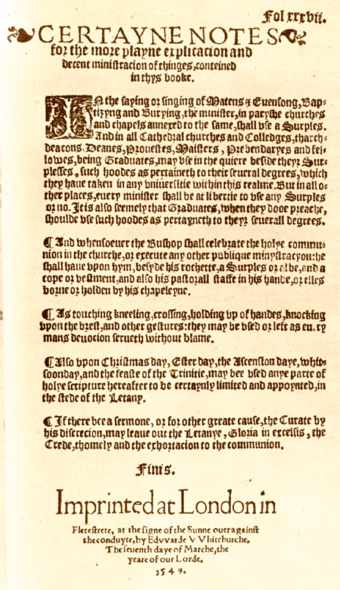| United States | England | Scotland | Ireland | Wales | Canada | World |
| |
The Book of Common Prayer | ||||||
|
|
|
OF CEREMONIES,
WHY SOME BE ABOLISHED AND SOME RETAYNED. OF suche Ceremonies
as be used in the Church, and have had their beginning by thinstitucion
of man: Some at the first were of godly intent and purpose devised,
and yet at length turned to vanitie and supersticion: Some entred into
the Churche by undiscrete devocion, and suche a zele as was without
knowlage, and for because they were winked at in the beginning, they
grewe dayly to more and more abuses, which not onely for their unprofitablenesse,
but also because they have muche blynded the people, and obscured the
glory of God, are worthy to be cut awaye, and cleane rejected. Other
there be, which although they have been devised by man: yet it is thought
good to reserve them still as well for a decent ordre in the Churche
(for the which they were first devised) as because they pertayne to
edificacion. Wherunto all thynges doen in the Churche (as the Apostle
teacheth) ought to be referred. And although the keping or omytting
of a ceremonie (in itselfe considered) is but a small thyng: Yet the
wilfull and contemptuous transgression, and breakyng of a common ordre,
and disciplyne, is no small offence before God. Let all thynges bee
done emong you (sayeth Sainte Paule) in a semely and due ordre. The
appoyntemente of the whiche ordre pertayneth not to pryvate menne: Therfore
no manne ought to take in hande nor presume to appoynte or alter any
publyke or common ordre in Christes Churche, excepte he be lawfully
called and autorized thereunto. And whereas in this our tyme, the myndes
of menne bee so diverse, that some thynke it a greate matter of conscience
to departe from a peece of the leaste of theyr Ceremonies (they bee
so addicted to their olde customes), and agayne on the other syde, some
bee so newe fangle that they woulde innovate all thyng, and so doe despyse
the olde that nothyng canne lyke them, but that is newe: It was thought
expediente not so muche to have respecte howe to please and satisfie
eyther of these partyes, as howe to please God, and profitte them bothe.
And yet leste any manne should bee offended (whom good reason might
satisfie), here be certayne causes rendered, why some of the accustomed
Ceremonies be put awaye, and some be retayned and kept still. |
|
for
the more playne explicacion and
|
* shall in several printings |
|
¶ And whensoever the Bushop shall celebrate the holye communion in the churche, or execute any other publique minystracyon, he shall have upon hym, besyde his rochette, a Surples or albe, and a cope or vestment, and also his pastorall staffe in his hande, or elles borne or holden by his chapeleyne [chaplain]. ¶ As touching kneeling, crossing, holding up of handes, knocking upon the brest, and other gestures: they may be used or left as every mans devocion serveth without blame. ¶ Also upon Christmas day, Ester day, the Ascension daye, whit-Soonday, and the feaste of the Trinitie, may bee used anye parte of holye scripture hereafter to be certaynly limited and appoynted, in the stede of the Letany. ¶ If there bee a sermone, or for other greate cause, the Curate by his discretion may leave out the Letanye, Gloria in excelsis, the Crede, thomely [the homily], and the exhortation to the communion. FINIS.
|
|
| Imprinted
at London in The
Kinges Majestie, by GOD
SAVE THE KYNG.
|
|
 |
Last page of the 1549 Book of Common Prayer |
Return to the 1549 Book of Common Prayer
| Web author: Charles Wohlers | U. S. • England • Scotland • Ireland • Wales • Canada • World |